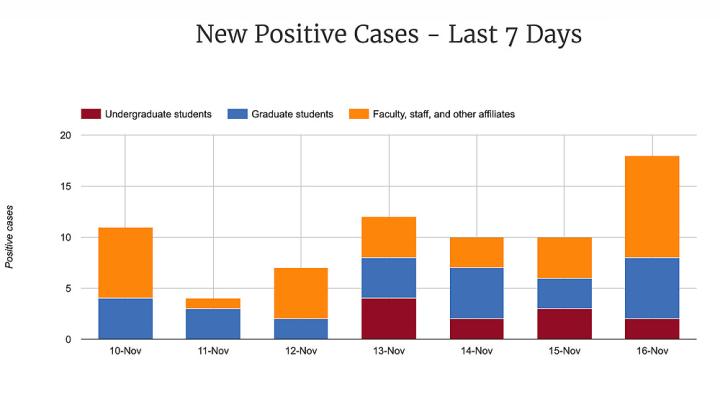Harvard Business School (HBS) announced that a rising number of coronavirus cases has forced it to pull back from hybrid (in-class and remote) learning for the rest of the semester. Although the Medical School has had its second- through fourth-year M.D. students pursuing their clinical rotations, it conducted first-year M.D. instruction remotely—leaving HBS as the only University faculty to conduct some hybrid classrooms during the fall term. But according to an HBS community message from dean Nitin Nohria and executive dean for administration Angela Crispi on November 14, that has now halted in light of increased infections:
We are writing to let you know that we are extending the move to remote-only instruction and limits to on-campus activities for the remainder of the semester. Students should expect all classes to be conducted via Zoom; other activities and events that were planned for on campus will need to move online. Additionally…we are asking that you significantly limit your social interactions with others.
They cited “the pace at which new positive cases are being identified” (five community members the prior Monday, and 24 as of the day of their message), the number of individuals in quarantine (rising from 14 to 114), and the increase in those in quarantine who later test positive for COVID-19: “In the initial weeks of the semester, this simply wasn't happening. This week, 8 individuals in quarantine now have tested positive.”
Their succinct takeaway: “In short, transmission is occurring among members of our community—largely among a subset of our M.B.A. students, who represent approximately 70 percent of the total cases—rather than as a result of activities involving persons outside our community.” They continued:
Additionally, we are seeing higher numbers (including occasionally in the double digits) of close contacts. Infections seem to be occurring as a result of activities that are natural and benign in normal times: group dinners and other social gatherings, group athletic activities, and travel without proper quarantine upon return among some number of our students. But during a time when the pandemic is surging broadly, it means infections in our community are likely to continue to rise at an unacceptable rate.
If the upsurge had taken place earlier in the semester, Nohria and Crispi wrote, they would have transitioned HBS to remote learning for a few weeks and then returned to in-person instruction. But with Thanksgiving near and few classes scheduled thereafter, students’ travel plans and the realities of quarantining result in too few students on hand to sustain hybrid classes. The result is disappointing, because “we have stressed from the beginning—and continue to feel confident—that our classrooms, dining halls, and other on-campus spaces are not the locus of infection in our community. Indeed, as of today, we have no evidence of infection occurring as a result of contact or interaction in these locations.”
But the reality is that infection rates are soaring nationwide, and have increased steadily in Massachusetts as well, meaning that “we must be both cognizant that the risk of infection against this backdrop is generally higher, and extra vigilant that we do not contribute to transmission to our neighboring communities.” The move to remote learning is thus intended to “bend the trajectory of the current spike and limit the number of new infections”—in part by having everyone commit to “identify[ing] their own small pod—no more than a half dozen individuals with whom you’ll interact for the remainder of the semester. To be crystal clear: this does not mean a half dozen individuals at a time, but rather in total. Hunker down, find ways to connect with other classmates virtually outside your pod, and significantly limit your in-person contact with others.”
Beyond the move to remote learning, HBS is “encouraging” all M.B.A. students to test for the virus three times in the week from the announcement, offering testing to partners who are close contacts of infected students while they are quarantining, and banning all in-person gatherings and events on campus (including one-on-one meetings in offices).
Nohria and Crispi held out the hope of resuming hybrid education in the spring semester. Their message appears here.
The University coronavirus dashboard shows the upwelling of infection, with 12 positive cases on November 13, 11 on November 14, 11 on November 15, and 18 on November 16—contributing significantly to the 190 total positive cases logged cumulatively from June 1. That trend will merit watching, as the College approaches its early-December deadline for announcing which undergraduates will be invited to campus for the spring semester (during which instruction will continue to be conducted remotely).







